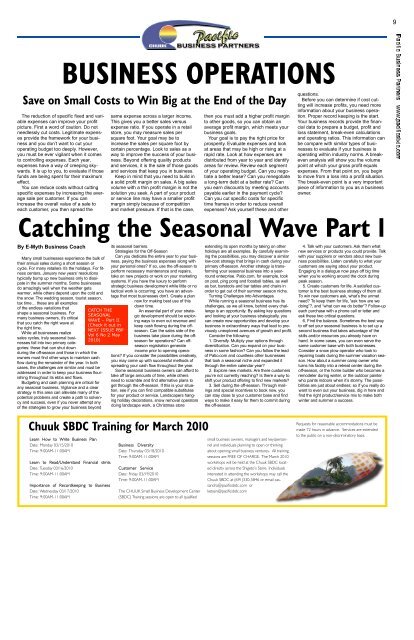February 2010 - Pacific Islands Small Business Development Center ...
February 2010 - Pacific Islands Small Business Development Center ...
February 2010 - Pacific Islands Small Business Development Center ...
Create successful ePaper yourself
Turn your PDF publications into a flip-book with our unique Google optimized e-Paper software.
9BUSINESS OPERATIONSSave on <strong>Small</strong> Costs to Win Big at the End of the DayThe reduction of specific fixed and variableexpenses can improve your profitpicture. First a word of caution. Do notneedlessly cut costs. Legitimate expensesprovide the framework for your businessand you don’t want to cut youroperating budget too deeply. However,you must be ever vigilant when it comesto controlling expenses. Each year,expenses have a way of creeping skywards.It is up to you, to evaluate if thosefunds are being spent for their maximumeffect.You can reduce costs without cuttingspecific expenses by increasing the averagesale per customer. If you canincrease the overall value of a sale toeach customer, you then spread thesame expense across a larger income.This gives you a better sales versusexpense ratio. If you operate in a retailstore, you may measure sales persquare foot. Your goal may be toincrease the sales per square foot bycertain percentage. Look to sales as away to improve the success of your business.Beyond offering quality productsand services, it is the sale of those goodsand services that keep you in business.Keep in mind that you need to build ina solid profit margin on sales. A big salesvolume with a thin profit margin is not thesolution you seek. A part of your productor service line may have a smaller profitmargin simply because of competitionand market pressure. If that is the case,then you must add a higher profit marginto other goods, so you can obtain anaverage profit margin, which meets yourbusiness goals.Your goal is to pay the right price forprosperity. Evaluate expenses and lookat areas that may be high or rising at arapid rate. Look at how expenses aredistributed from year to year and identifyareas for review. Review each segmentof your operating budget. Can you negotiatea better lease? Can you renegotiatea long-term debt at a better rate? Canyou earn discounts by meeting accountspayable earlier in the payment cycle?Can you cut specific costs for specifictime frames in order to reduce overallexpenses? Ask yourself these and otherquestions.Before you can determine if cost cuttingwill increase profits, you need moreinformation about your business operation.Proper record keeping is the start.Your business records provide the financialdata to prepare a budget, profit andloss statement, break-even calculationsand operating ratios. This information canbe compare with similar types of businessesto evaluate if your business isoperating within industry norms. A breakevenanalysis will show you the volumepoint at which your gross profit equalsexpenses. From that point on, you beginto move from a loss into a profit situation.The break-even point is a very importantpiece of information to you as a businessowner.Catching the Seasonal Wave Part 1By E-Myth <strong>Business</strong> CoachMany small businesses experience the bulk oftheir annual sales during a short season orcycle. For many retailers it’s the holidays. For fitnesscenters, January new years’ r e s o l u t i o n stypically bump up new business only to dissipatein the summer months. Some businessesdo amazingly well when the weather getsw a r m e r, while others depend upon the cold andthe snow. The wedding season, tourist season,tax time… these are all examplesof the endless variations thatshape a seasonal business. Formany business owners, it’s criticalthat you catch the right wave atthe right time.While all businesses realizesales cycles, truly seasonal businessesfall into two primary categories:those that can shut downduring the off-season and those in which theowners must find other ways to maintain cashflow during the remainder of the year. In bothcases, the challenges are similar and must beaddressed in order to keep your business flourishingthroughout its ebbs and flows.Budgeting and cash planning are critical forany seasonal business. Vigilance and a clearstrategy in this area can alleviate many of thepotential problems and create a path to solvencyand success, even if you never attempt anyof the strategies to grow your business beyondCATCH THESEASONALWAVE – Part II(Check it out inNEXT ISSUE PBPVol 6 No 2 May<strong>2010</strong>)its seasonal barriers.Strategies for the Off - S e a s o nCan you dedicate the entire year to your business,paying the business expenses along withyour personal ones? If so, use the off-season toperform necessary maintenance and repairs,take on new projects or work on your marketingsystems. If you have the luxury to performstrategic business development while little or notactical work is occurring; you have an advantagethat most businesses don’t. Create a plannow for making best use of thisdown time.An essential part of your strategicdevelopment should be exploringways to even out revenue andkeep cash flowing during the off -season. Can the sales side of thebusiness take place during the off -season for operations? Can off -season registration generateincome prior to opening operations?If you consider the possibilities creatively,you may come up with successful methods ofspreading your cash flow throughout the year.Some seasonal business owners can afford totake off large amounts of time, while othersneed to scramble and find alternative plans toget through the off-season. If this is your situation,see if you can find compatible substitutesfor your product or service. Landscapers hangingholiday decorations, snow removal operatorsdoing landscape work, a Christmas storeextending its open months by taking on otherholidays are all examples. By carefully examiningthe possibilities, you may discover a similarlow-cost strategy that brings in cash during yourprimary off-season. Another strategy is transformingyour seasonal business into a yearroundenterprise. Patio.com, for example, tookon pool, ping pong and foosball tables, as wellas bar, barstools and bar tables and chairs inorder to get out of their summer season niche.Turning Challenges into A d v a n t a g e sWhile running a seasonal business has itschallenges, as we all know, behind every challengeis an opportunity. By asking key questionsand looking at your business strategically, youcan create new opportunities and develop yourbusiness in extraordinary ways that lead to previouslyunexplored avenues of growth and profit.Consider the following:1. Diversify. Multiply your options throughdiversification. Can you expand on your businessin some fashion? Can you follow the leadof Patio.com and countless other businessesthat took a seasonal niche and expanded itthrough the entire calendar year?2. Explore new markets. Are there customersyou’re not currently reaching? Is there a way toshift your product offering to find new markets?3. Sell during the off-season. Through mailingsand special incentives to book now, youcan stay close to your customer base and findways to make it easy for them to commit duringthe off-season.4. Talk with your customers. Ask them whatnew services or products you could provide. Ta l kwith your suppliers or vendors about new businesspossibilities. Listen carefully to what yourcustomers are saying about your product.Engaging in a dialogue now pays off big timewhen you’re working around the clock duringpeak season.5. Create customers for life. A satisfied customeris the best business strategy of them all.To win new customers ask, what’s the unmetneed? To keep them for life, “ask how are wedoing”?, and “what can we do better”? Follow-upeach purchase with a phone call or letter andask these two critical questions.6. Find the balance. Sometimes the best wayto off set your seasonal business is to set up asecond business that takes advantage of theskills and/or resources you already have onhand. In some cases, you can even serve thesame customer base with both businesses.Consider a snow plow operator who took torepairing boats during the summer vacation season.How about a summer camp owner whoturns his facility into a retreat center during theo ff-season, or the home builder who becomes aremodeler during winter, or the outdoor painterwho paints indoors when it’s stormy. The possibilitiesare just about endless; so if you really dowant to even out your business, dig in here andfind the right product/service mix to make bothwinter and summer a success.Chuuk SBDC Training for March <strong>2010</strong>Learn How to Write <strong>Business</strong> PlanDate: Monday 03/15/<strong>2010</strong>Time: 9:00AM-11:00AMLearn to Read/Understand Financial stmtsDate: Tuesday 03/16/<strong>2010</strong>Time: 9:00AM-11:00AMImportance of Recordkeeping to <strong>Business</strong>Date: Wednesday 03/17/<strong>2010</strong>Time: 9:00AM-11:00AM<strong>Business</strong> DiversityDate: Thursday 03/18/<strong>2010</strong>Time: 9:00AM-11:00AMCustomer ServiceDate: Friday 03/19/<strong>2010</strong>Time: 9:00AM-11:00AMThe CHUUK <strong>Small</strong> <strong>Business</strong> <strong>Development</strong> <strong>Center</strong>(SBDC) Training sessions are open to all qualifiedsmall business owners, managers and key/personneland individuals planning to open or thinkingabout opening small business ventures. All trainingsessions are FREE OF CHARGE. The March <strong>2010</strong>workshops will be held at the Chuuk SBDC locateddirectly across the Shigeto’s Store. Individualsinterested in attending the workshops may call theChuuk SBDC at (691)330-5846 or email cassandra@pacificsbdc.comorketsen@pacificsbdc.comRequests for reasonable accommodations must bemade 72 hours in advance. Services are extendedto the public on a non-discriminatory basis.








